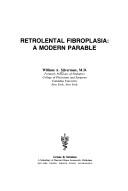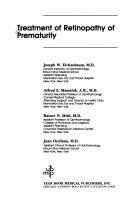| Listing 1 - 10 of 41 | << page >> |
Sort by
|

ISBN: 080891264X 9780808912644 Year: 1980 Publisher: New York Grune & Stratton
Abstract | Keywords | Export | Availability | Bookmark
 Loading...
Loading...Choose an application
- Reference Manager
- EndNote
- RefWorks (Direct export to RefWorks)
Book
ISBN: 3432928319 Year: 1982 Publisher: Stuttgart Enke
Abstract | Keywords | Export | Availability | Bookmark
 Loading...
Loading...Choose an application
- Reference Manager
- EndNote
- RefWorks (Direct export to RefWorks)

ISBN: 081513049X 9780815130499 Year: 1990 Publisher: Chicago Year Book Medical Publishers
Abstract | Keywords | Export | Availability | Bookmark
 Loading...
Loading...Choose an application
- Reference Manager
- EndNote
- RefWorks (Direct export to RefWorks)
Retrolental fibroplasia --- Retinopathy of Prematurity --- Treatment --- therapy
Book
Year: 1979 Publisher: Ludwigshafen : Paris : BASF ; Maison Rustique,
Abstract | Keywords | Export | Availability | Bookmark
 Loading...
Loading...Choose an application
- Reference Manager
- EndNote
- RefWorks (Direct export to RefWorks)
Crops --- Poaceae --- Weeds --- Prematurity --- identification. --- identification --- Grande culture
Periodical
Abstract | Keywords | Export | Availability | Bookmark
 Loading...
Loading...Choose an application
- Reference Manager
- EndNote
- RefWorks (Direct export to RefWorks)
Neonatology --- Perinatology. --- Neonatology. --- Infant, Newborn, Diseases. --- Research --- neonatology --- neonatal health --- newborns --- infants --- prematurity --- paediatrics --- Geriatrics
Dissertation
ISBN: 8389898462 Year: 2009 Publisher: Groningen Rijksuniversiteit Groningen
Abstract | Keywords | Export | Availability | Bookmark
 Loading...
Loading...Choose an application
- Reference Manager
- EndNote
- RefWorks (Direct export to RefWorks)
Retinal Neovascularization --- Retinopathy of Prematurity --- Angiopoietin-2 --- Diabetic Retinopathy --- pathology --- physiopathology --- genetics
Book
ISBN: 044303480X Year: 1987 Publisher: Edinburgh Churchill Livingstone
Abstract | Keywords | Export | Availability | Bookmark
 Loading...
Loading...Choose an application
- Reference Manager
- EndNote
- RefWorks (Direct export to RefWorks)
Premature infants --- Infant, Premature --- Infant, Premature, Diseases --- Neonatal Prematurity --- Premature Infants --- Preterm Infants --- Infant, Preterm --- Infants, Premature --- Infants, Preterm --- Premature Infant --- Prematurity, Neonatal --- Preterm Infant --- Gestational Age --- Obstetric Labor, Premature --- Premature Birth --- Birth, Premature --- Infants (Premature) --- Preemies --- Preterm infants --- Newborn infants --- Birth weight, Low --- Diseases --- Paediatrics --- Gynaecology. Obstetrics
Book
Year: 2015 Publisher: Frontiers Media SA
Abstract | Keywords | Export | Availability | Bookmark
 Loading...
Loading...Choose an application
- Reference Manager
- EndNote
- RefWorks (Direct export to RefWorks)
Early human development from late gestation to the neonatal period is a critical time in the individual’s life span. Medical issues that compromise the brain functions during late gestation and the first months of life could lead to different developmental problems with consequent lifelong burdens for the growing individuals and their families, and a major socio-economic impact for the health care system and the whole of society. Any potential alleviation of perinatal adversities holds promise of an improved quality of life for the individual, and a major benefit for the society at large. It remains a concerted worldwide effort to improve our understanding on effective monitoring systems and clinical diagnostic procedures to reduce fetal impairment and improve healthcare in the neonatal and infant period. The focus of this Research Topic will be on the most recent developments and findings in the field of non-invasive functional brain monitoring in order to: 1) increase our knowledge on novel diagnostic tools and procedures for the surveillance of fetuses and newborn babies, 2) help us to perform high quality functional assessment of the developing human brain during pregnancy and after birth, 3) understand and diagnose pathological developments with a potentially high clinical and societal impact, 4) understand how to improve perinatal and infant care. Potential topics include, but are not restricted to: 1) non-invasive electrophysiological monitoring technologies for brain function in the fetus, neonate and infant, such as electroencephalography (EEG), magnetoencephalography (MEG), functional magnetic resonance imaging (fMRI) and near infra-red spectroscopy (NIRS), 2) novel or consolidated analytical methods and models for the quantification and interpretation of the functional signals recorded from the developing brain, 3) typical and atypical brain development during pregnancy and the first years of life, 4) personalized clinical diagnostic procedures for perinatal and paediatric surveillance.
Fetus --- Newborn infants --- Neurosciences --- Brain --- Development. --- Research. --- Imaging. --- embryology. --- magnetic resonance imaging (MRI) --- Electroencephalography (EEG) --- prematurity --- neurodevelopment --- connectivity --- Brain monitoring --- cerebral blood flow --- autonomic nervous system (ANS) --- Diffusion tensor imaging (DTI) --- fetal magnetocardiography (fMCG)
Book
Year: 2015 Publisher: Frontiers Media SA
Abstract | Keywords | Export | Availability | Bookmark
 Loading...
Loading...Choose an application
- Reference Manager
- EndNote
- RefWorks (Direct export to RefWorks)
Early human development from late gestation to the neonatal period is a critical time in the individual’s life span. Medical issues that compromise the brain functions during late gestation and the first months of life could lead to different developmental problems with consequent lifelong burdens for the growing individuals and their families, and a major socio-economic impact for the health care system and the whole of society. Any potential alleviation of perinatal adversities holds promise of an improved quality of life for the individual, and a major benefit for the society at large. It remains a concerted worldwide effort to improve our understanding on effective monitoring systems and clinical diagnostic procedures to reduce fetal impairment and improve healthcare in the neonatal and infant period. The focus of this Research Topic will be on the most recent developments and findings in the field of non-invasive functional brain monitoring in order to: 1) increase our knowledge on novel diagnostic tools and procedures for the surveillance of fetuses and newborn babies, 2) help us to perform high quality functional assessment of the developing human brain during pregnancy and after birth, 3) understand and diagnose pathological developments with a potentially high clinical and societal impact, 4) understand how to improve perinatal and infant care. Potential topics include, but are not restricted to: 1) non-invasive electrophysiological monitoring technologies for brain function in the fetus, neonate and infant, such as electroencephalography (EEG), magnetoencephalography (MEG), functional magnetic resonance imaging (fMRI) and near infra-red spectroscopy (NIRS), 2) novel or consolidated analytical methods and models for the quantification and interpretation of the functional signals recorded from the developing brain, 3) typical and atypical brain development during pregnancy and the first years of life, 4) personalized clinical diagnostic procedures for perinatal and paediatric surveillance.
Fetus --- Newborn infants --- Neurosciences --- Brain --- Development. --- Research. --- Imaging. --- embryology. --- magnetic resonance imaging (MRI) --- Electroencephalography (EEG) --- prematurity --- neurodevelopment --- connectivity --- Brain monitoring --- cerebral blood flow --- autonomic nervous system (ANS) --- Diffusion tensor imaging (DTI) --- fetal magnetocardiography (fMCG)
Book
Year: 2015 Publisher: Frontiers Media SA
Abstract | Keywords | Export | Availability | Bookmark
 Loading...
Loading...Choose an application
- Reference Manager
- EndNote
- RefWorks (Direct export to RefWorks)
Early human development from late gestation to the neonatal period is a critical time in the individual’s life span. Medical issues that compromise the brain functions during late gestation and the first months of life could lead to different developmental problems with consequent lifelong burdens for the growing individuals and their families, and a major socio-economic impact for the health care system and the whole of society. Any potential alleviation of perinatal adversities holds promise of an improved quality of life for the individual, and a major benefit for the society at large. It remains a concerted worldwide effort to improve our understanding on effective monitoring systems and clinical diagnostic procedures to reduce fetal impairment and improve healthcare in the neonatal and infant period. The focus of this Research Topic will be on the most recent developments and findings in the field of non-invasive functional brain monitoring in order to: 1) increase our knowledge on novel diagnostic tools and procedures for the surveillance of fetuses and newborn babies, 2) help us to perform high quality functional assessment of the developing human brain during pregnancy and after birth, 3) understand and diagnose pathological developments with a potentially high clinical and societal impact, 4) understand how to improve perinatal and infant care. Potential topics include, but are not restricted to: 1) non-invasive electrophysiological monitoring technologies for brain function in the fetus, neonate and infant, such as electroencephalography (EEG), magnetoencephalography (MEG), functional magnetic resonance imaging (fMRI) and near infra-red spectroscopy (NIRS), 2) novel or consolidated analytical methods and models for the quantification and interpretation of the functional signals recorded from the developing brain, 3) typical and atypical brain development during pregnancy and the first years of life, 4) personalized clinical diagnostic procedures for perinatal and paediatric surveillance.
Fetus --- Newborn infants --- Neurosciences --- Brain --- magnetic resonance imaging (MRI) --- Electroencephalography (EEG) --- prematurity --- neurodevelopment --- connectivity --- Brain monitoring --- cerebral blood flow --- autonomic nervous system (ANS) --- Diffusion tensor imaging (DTI) --- fetal magnetocardiography (fMCG) --- Development. --- Research. --- Imaging. --- embryology.
| Listing 1 - 10 of 41 | << page >> |
Sort by
|

 Search
Search Feedback
Feedback About UniCat
About UniCat  Help
Help News
News